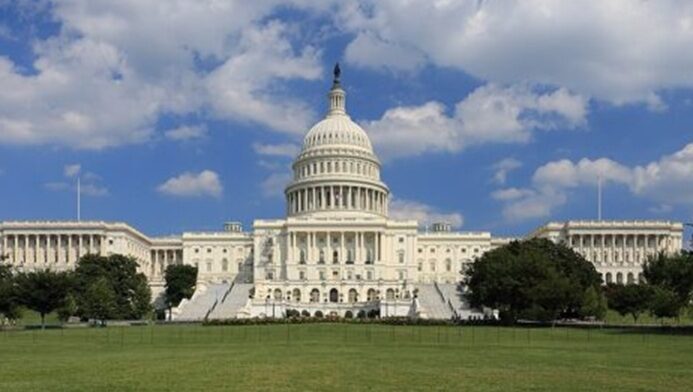Bills to create a Clean Energy and Sustainability Accelerator that can leverage $100 billion of public funds to finance up to $463 billion in total investment over the next four years have been introduced in the House and the Senate.
The expectation is that the Accelerator will be pulled into a larger bill, most likely an infrastructure and climate package. The Accelerator would make up a significant piece of President Biden’s goal of $2 trillion in infrastructure spending.
Some bipartisan support exists, but a bill that includes this type of federal clean energy financing mechanism can also be passed using the budget reconciliation process.

“[Investing in clean energy] is an economic opportunity,” said Debbie Dingell, the Michigan Member of Congress who, along with Sens. Edward Markey (D-Mass.) and Chris Van Hollen (D-Md), re-introduced legislation that would create the Clean Energy and Sustainability Accelerator.
“When we invest in clean energy projects at home, we can export American technology and expertise overseas instead of importing foreign oil,” Markey said.
As currently envisioned, the Accelerator would seek investment and procurements in areas such as renewables, storage, transportation, transmission, resiliency, efficiency, reforestation, agriculture, and industrial de-carbonization. The bills currently structure the Accelerator as an independent non-profit capitalized with $50 billion and topped up with $10 billion a year for its first five years.
Carbon copy for decarbonization
The model for the Accelerator is not new. For years, state green banks in New York, Connecticut, Michigan and elsewhere have used a model that pairs each public dollar with multiple private dollars to expand clean energy’s reach. Several local funds, including Florida’s Solar and Energy Loan Fund, also exist.
“During the last decade, the green bank model has proven to have an outsized impact in states, creating good-paying jobs and decarbonizing the economy,” said Reed Hundt, CEO of the Coalition for Green Capital said. He expressed confidence that the Accelerator can be passed by both chambers and signed by President Biden this year.
In 2020, nearly 100 organizations voiced support for the Clean Energy Jobs Fund, which included a Clean Energy Accelerator in both its House and Senate versions. Letters of support came from state green banks, start-ups, clean tech investors, utilities, energy industry trade groups (including the Solar Energy Industries Association and Energy Storage Association), and several environmental organizations, including the National Resources Defense Council (NRDC), the Sierra Club, Environmental Defense Fund, the Union of Concerned Scientists, and Appalachian Voices.
Reducing risk
“U.S. companies have to compete globally with German, British, Indian, and Chinese firms, among others, all supported by government-backed financial institutions that have a specific public policy mandate,” the National Academies of Sciences, Engineering, and Medicine wrote in a report in which it expressed its support for a federal green bank to finance low to zero-carbon technology and infrastructure.
The report said that the German KfW is one of the largest development banks in the world, with assets exceeding €500 billion. It was initially the sole lender in Germany to solar companies, prior to financing from private banks. The China Development Bank holds assets exceeding $1 trillion and likewise has invested heavily in renewable energy and low-carbon infrastructure.

Image: Pixabay
“Private sources of capital are unlikely to be sufficient to finance the low-carbon economic transition, especially during the 2020s when the effort is new,” the National Academies report said.
Partial financing by a green bank would reduce risk for private investors and encourage rapid expansion of private sources capital, the report said. Because the public money invested under a green bank model is repaid over time, it can be redeployed.
To better align the economy with the risks and benefits of transition policies and climate change, the report’s authors also called for a policy that requires annual Securities and Exchange Commission reporting of these risks and benefits by private companies and their inclusion in stress tests by the Federal Reserve and in all cost-benefit analyses by federal agencies.
Although the United States currently has no domestic independent development, investment, or federal green bank, it has periodically used them in the past, the National Academies’ report noted, citing the War Finance Corporation, the Reconstruction Finance Corporation, which later became the capital bank for the 1930s-era New Deal, as past examples.
Environmental justice
“The renewable energy industry should look at this policy as the driver to radically expand the total addressable market that they can serve, which in turn means enormous growth opportunities,” said Jeffrey Schub, executive director of the Coalition for Green Capital, a nonprofit that incubates and supports local green banks.

image: Wikimedia
By design, the new Accelerator bill is aligned with President Biden’s Justice 40 Initiative. Because of this executive order, signed last week, the Accelerator bill now requires 40% of all investments to be directed into disadvantaged communities facing climate impacts.
“The Clean Energy and Sustainability Accelerator will be a critical catalyst for creating good jobs and increasing our health, wealth, safety and competitiveness,” said Doug Sims, director of the NRDC’s Green Finance Center. With a mandate to “focus on underserved communities of color and the just transition for fossil fuel communities and workers, it’s a tool for moving small towns, suburbs and cities forward together.”
In November, the Green Finance Institute, the NRDC and the Rocky Mountain Institute published a report aimed at informing the development of a Green Bank Design Platform that they hope entities can be use to establish green banks and other green financing vehicles.
For its part, the Coalition for Green Capital has been working to engage state and local entities to get them ready to receive Clean Energy Accelerator money.
This content is protected by copyright and may not be reused. If you want to cooperate with us and would like to reuse some of our content, please contact: editors@pv-magazine.com.








By submitting this form you agree to pv magazine using your data for the purposes of publishing your comment.
Your personal data will only be disclosed or otherwise transmitted to third parties for the purposes of spam filtering or if this is necessary for technical maintenance of the website. Any other transfer to third parties will not take place unless this is justified on the basis of applicable data protection regulations or if pv magazine is legally obliged to do so.
You may revoke this consent at any time with effect for the future, in which case your personal data will be deleted immediately. Otherwise, your data will be deleted if pv magazine has processed your request or the purpose of data storage is fulfilled.
Further information on data privacy can be found in our Data Protection Policy.